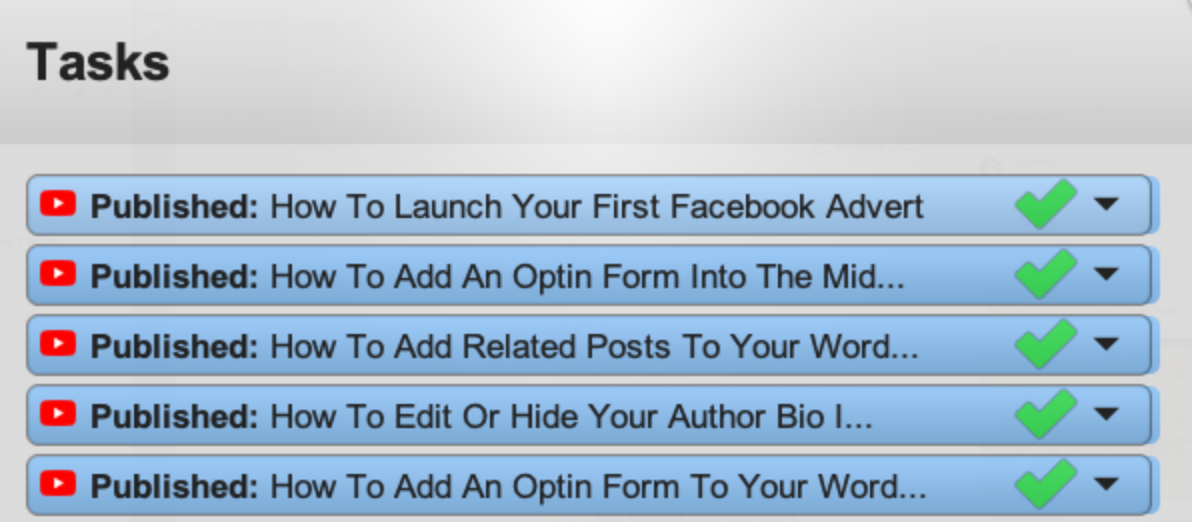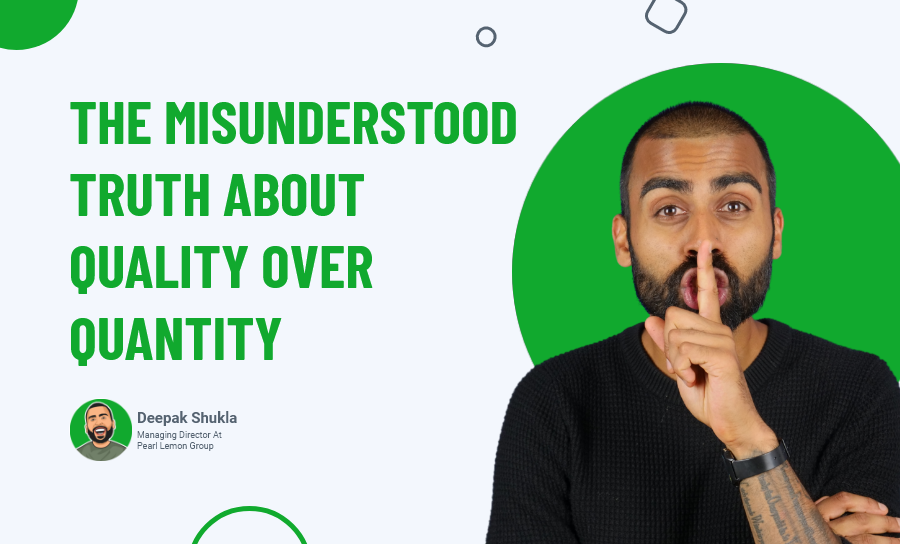Morning all,
Up on time today and ready to write –
![]()
(although given I wake up at 430 it’s still taking too long to get sat down and read to start hammering away)
Anyway, I was just doing a count of YouTube videos that I have that are yet to go live – and the count is 52.
And it got me to thinking about the cliched phrase that gets thrown around by many – “quality over quantity”.
In this blog post I’d like to reveal the misunderstood truth about this saying – and show a real world example of this in my case, it’s application – and whether I should actually be focussed upon quality…..quantity…or otherwise…
Let’s begin by talking about:
Table of Contents
My Quantitative approach to YouTube

Given my current rate of release (2x per day) – I’m currently 26 days ahead of my publishing race.
As I’m arguably taking a ‘quantity over quality approach’ – let’s map out what the outcome of this will look like:
_________
Let’s assume I’ll record 4 videos per day (which for me is approximately 45 minutes of recording time total – very doable in my morning 6-hour slots) from February 1st –
That means to fill up my entire YouTube channel for the rest of the calendar year I’d need –
365 days – 52 (26 days of content already done, 26 more to release) = 313 days remaining I need to record for.
Assuming I record 4 videos per day that means I need to divide 313/4 videos per day – which gives me 78.25 days of recording time needed to fill up the REST of the calendar year.
Let’s add another 11.75 days to this so 90 days to give me 45+ videos of buffer time for the days that I don’t get 4 videos per day done.
That means to fill up the rest of my calendar year I need to record 4 videos per day for 90 days in a row and I’ll have enough YouTube content for the rest of 2021.

I’m thinking about this is achievable – because without even trying to – I recorded 7 videos yesterday (5 via Screencastomatic and 2 using QuickTime)

It kind of reset my notion of what was possible in a day – because I fit this into the rhythm of my day without it blowing anything up.
Let’s now deal with some common questions (I looked up on Google) that people seem to ask in the context of my rate of production:
What does quality over quantity mean?

I believe this to mean that you should NOT sacrifice the quality of your work for the sake of doing more work.
In my instance – I record the best content when I do some planning just before I record the video, and then I improvise the video as I move through it.
If you also produce content in such a fashion but the QUALITY of your work suffers at the expense of quantity – then you need to reconsider this approach – however, you need to consider that quantity of production can VERY QUICKLY turn into the quality of production
What do you mean by quantity over quality?

This is a focus upon churning out as many ‘products’, ‘units’ or ‘things’ (whatever you’re building) as you can within a given timeframe.
There is distinct value in going for volume rather than quality which is this:
Quantity very quickly turns into Quality
As I produce videos on a daily basis – with each video I record (just as with each blog post I write) – I make many minor changes in every piece of content produced that when added together – can create a major impact.
This has already ranged from:
Video Type Experimentation
- Trying a black and white video
- Doing over-the-shoulder tutorials Vs talking head videos
- Building ‘journey videos’ i.e follow me on my journey of
- Doing ‘my experience of’ videos – i.e this is my experience of getting
- Creating a ‘welcome to the channel’ video
Video Length Experimentation
- Recording videos 2-4 minutes long
- Recording videos 4-10 minutes long
- Recording videos 10-20 minutes long
- Recording videos 20-30 minutes long
Video Background Experimentation
- Curtains for a background
- My mum’s living room for a background
- My flat living room for a background

I could continue but I think I’ll stop here. The point is – is that I’ve tried all of this level of experimentation within 26 days – an absolutely staggering amount of testing.
Had I gone for the “quality over quantity” ethos – I would not have been able to carry out this number of tests.
As each of these videos goes live on YouTube, I’m able to gather data based upon format and style.
It’ll surprise you to find out this as well – one of the best performing videos so far is one about my Hair Transplant in Turkey where I’m in my mum’s living room and the background is a washing line, some dusty shelves and I move around within the video twice.
[convertful id=”197358″]
That means, using the “quantity over quality” – I’ve confirmed (with the limited information I have to date based upon my own experimentation) that as long as the audio is clear (not world-class – I’m just using my laptop mic) and the visuals are clear (I use a Logitech C920 webcam) – that no-one cares.
What matters most is the quality of content – and everything else is forgiven.
And this is the overriding outcome of quantity over quality –
It IS quantity that drives quality because of our innate desire to improve at any given opportunity.
I.e as you storm through iteration after iteration of testing – you get incrementally better each time.
And the logic holds clear, right?
The More You Test – The Better You Get

I’m not exactly who said ‘quality over quantity’ – I was giving it a Google and nothing immediately came up – but you can attribute the above quote to ME lol.
(We’ll go through some quotes about ‘quality over quantity’ as well as ‘quantity over quality’ – and see what Google says about it in a minute – but first I’ll continue with my anecdotal experience of it all)
When you apply volume over anything – you unleash the massive power of testing – and this is how you unlock the opportunity to get massive gains.
I’m doing this in every aspect of my content production:
- I’m writing these blogs daily over such a wide range of topics that I’m passionate about. I wake up every morning not knowing what I’m doing to be writing about – but work with whatever I’m interested in – in that moment
- I then follow up with producing 5 Quora answers about the same subject to reinforce what I’m writing about
- I’ll then spend $10 of running ads towards that new question I’ve just answered to give my answer a little bump
- I repeat this cycle (as of yesterday anyway lol) every day in order to see what MY 80/20 will be
- (I’m also running ads to my YouTube channel – and I intend to get incrementally better at it all as I learn more)
Quantity Over Quality Unlocks The 80/20 Principle
This is a critical element of success that comes from many quantitative endeavours.
The most successful {anything} have tried and tried again when it comes to stand up comedy shows (Kevin Hart did 1,000+ before he found fame), the perfect free kick (David Beckham would spend hours practicing this alone), the perfect free-throw (eons of basket players spend hours practicing this).
And then in business at a macro level – no entrepreneur can specifically know:
- Which business idea will ‘take off’
- Which YouTube video will ‘take off’
- Which Facebook Advert will ‘take off’
And so on and so forth.
Only as a consequence of testing can we determine which ‘thing’ that we do will drive massive results for us.
God knows with Pearl Lemon my agency I try many many activities and work with many many people in order to drive more and more sales for the business.
In the end – the activity that drives 80% of our results is inbound SEO and applying for jobs on Upwork.
But still, I try, still, I test, in search for other platforms that will work for me as well as they seem to work for others.
Now let’s look at some quotes and offer some insights into them:
Steve Jobs said:
‘Quality is more important than quantity. One home run is much better than two Doubles’

I think this is in reference to launching with a perfect product…but here’s the kicker – I think this misunderstands the amount of ‘testing’ – of the quantitative kind that goes into his approach.
I managed to dig up at 15-year-old article from the Guardian where someone working with Jobs writes (and this is in reference to his presentation skills):
“It represents weeks of work, precise orchestration and intense pressure for the scores of people who collectively make up the “man behind the curtain”. I know, because I’ve been there, first as part of the preparation team and later on stage with Steve.”
To add to this – there’s another quote from Malcolm Gladwell I found (you got to know who he is!) from his book Outliers which also talk about continual practice:
“Even Mozart—the greatest musical prodigy of all time— couldn’t hit his stride until he had his ten thousand hours in. Practice isn’t the thing you do once you’re good. It’s the thing you do that makes you good.”
That’s f*cking powerful right?
I’m thinking of all of the people that say I shouldn’t take a volume-based approach to my production – which is ultimately all testing anyway.
There are folks who pore hours over the content and then see nothing happen with it.
And whilst some may say – well practice is what reinforces the ‘perfect performance’ – this belies the reality that Mozart produced over 600 compositions and I’m certain that less than 50 of them (probably a lot less) are well known.
I.e it’s 20% of his work that carried everything else.
And if he produced over 600 compositions I’m sure he had hopes/intentions to produce well over 1,000.
Let’s continue with a couple more to try and underline this point:
Mahatma Gandhi said: “It is the quality of our work which will please God and not the quantity”.
This is most likely massively taken out of context and I’m nobody (at all) to make any criticism of any such figure – but the truth is – naturally – it is your best work that will get the most recognition.
This is natural – and therefore what Gandhi is saying is correct.
Quality is quite a relative thing though of course – when talking about entrepreneurship. How do you judge quality accurately when thinking of business launched, service delivered or otherwise.
Furthermore, how many of us truly know the failed attempts that many of us embark upon before hitting gold.
With something like food – this does not hold at all (but I assume that’s obvious to us all) as well as in many other spaces.
So it’s worth noting that in the realm of:
- Time with people you love
- Food that you eat
The quantity over quality thesis doesn’t hold. But I know you know that and so let’s sum this up.
The Famous Pottery Teacher Example
I first came to know of this approach through the pottery example.
This is an excerpt taken from the book Art & Fear by Bayles and Orland:
“The ceramics teacher announced on opening day that he was dividing the class into two groups. All those on the left side of the studio, he said, would be graded solely on the quantity of work they produced, all those on the right solely on its quality.
His procedure was simple: on the final day of class he would bring in his bathroom scales and weigh the work of the “quantity” group: fifty pounds of pots rated an “A”, forty pounds a “B”, and so on. Those being graded on “quality”, however, needed to produce only one pot – albeit a perfect one – to get an “A”.
Well, came grading time and a curious fact emerged: the works of highest quality were all produced by the group being graded for quantity. It seems that while the “quantity” group was busily churning out piles of work – and learning from their mistakes – the “quality” group had sat theorizing about perfection, and in the end had little more to show for their efforts than grandiose theories and a pile of dead clay.”
This underlines the truth about how to drive success once more.
Then combine this (as earlier we were talking about Beckham/Basketball Players and the like) with a little more obscure factoid I found out about a swimmer called Shinji – a swimmer who begun swimming in his 30s…
And check it out – his videos have racked up more views that Phelps has of swimming – and if you look to an interview by him which I dug up – he says this:
“I made it my goal to become the “most graceful swimmer in the world.” Whenever I was in Japan I spent 3 to 4 hours in the Endless Pool. usually from 10PM to 2AM, four days a week, recording my swim, analyzing it frame by frame, finding and fixing small flaws, one by one.”
I hope guys – this underlines my point :p
Final Thoughts

Not sure that I have any specifically – I just have started adding ‘final thoughts’ to my blogs now lol
But I will say this:
I really hope you think about how this impacts your journey – and the way that you approach anything you wish to achieve excellence in and get recognition for.
I’m keen on sharing my journey with the world via a blog.
So it’s simple – I’m doing WAY more of it – blogging (and YouTubing) that is.
Let’s see how I get on.
P.s 80 minutes in –
![]()
Good work today 😛



